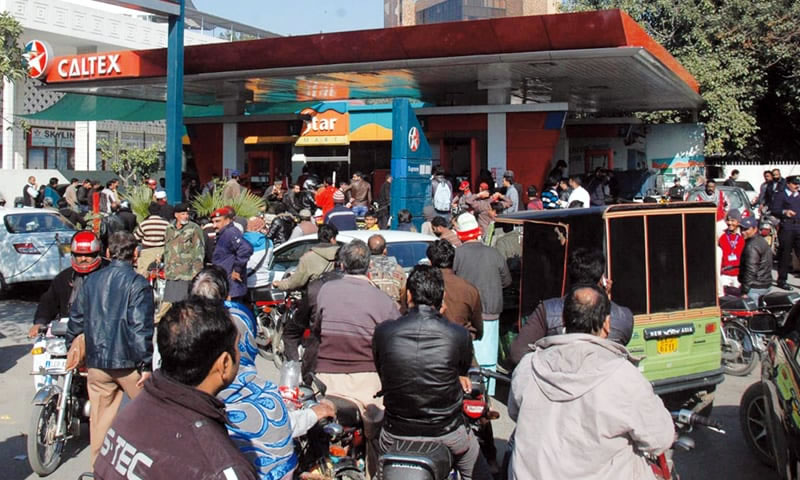The commission set up by the prime minister to investigate the 10-day oil crisis which almost paralysed the country this month has blamed almost the entire oil supply chain, including the ministries of power, petroleum and finance,
[contentblock id=1 img=adsense.png]
Oil and Gas Regulatory Authority (Ogra), the management and board of Pakistan State Oil (PSO), market players and Pakistan National Shipping Corporation (PNSC) for the acute fuel shortage.
The two-member commission comprising Zahid Muzaffar and Zafar Masud recommended structural reforms in the energy sector and maintaining above 300,000 tons of fuel stocks at all times to cover at least 20 days of consumption. Members of the commission considered close to Finance Minister Ishaq Dar called for action against the chairman and member of Ogra, reprimanded the PNSC management and fixed direct responsibility on eight officers of the petroleum ministry and PSO. The inquiry report available with Dawn also accused what it described as the black sheep in the oil industry – oil marketing companies (OMCs) and dealers – of being involved in hoarding and black marketing of petrol. It suggested diversion of at least 50 per cent power sector bills and tariff differential subsidy to the PSO to avoid similar crisis in future. It also accused the Oil Companies Advisory Council (OCAC) of having been negligent. The report said the crisis had been brewing for quite some time and “surely a result of structural issues and not only an event-driven situation”, adding that some issues needed to be fixed urgently while structural issues could be tackled in medium to long-term.
[contentblock id=2 img=gcb.png]
The issues identified by the report included poor management practices, systems and management incompetence at the PSO, inability to appreciate the extent of the potential issue by the petroleum ministry and failure of Ogra to do its job of prudent monitoring of OMCs amid falling prices. It said inventory losses resulted in OMCs shying away from holding inventory for a longer period and lack of crisis management rules of business across the sector. The OMCs failed to invest in storage facilities and were not maintaining the stocks required for emergency. Also a sudden surge in demand because of falling patrol prices and the rationing of CNG in the market contributed to the problem and strong possibilities of hoarding at the distributor and retail level. “The private sector OMCs may also be involved in creating this artificial shortage,” it said. The report also identified chronic capacity and competence issues within the public sector and ownership issues within bureaucracy and mounting receivables from the water and power ministry and the delay in payments by the power sector companies due to resurrection of the circular debt issue. One thing is absolutely clear that the crisis has arisen fundamentally due to indifference and incompetence of the PSO management.
In this respect, the then acting managing director, CFO, GM (retail), senior GM (supply chain) and DMD (operations) are at fault. They surely did not play the role required to handle the situation. There are surely room available in PSO’s balance sheet to raise more funding from the market but the necessary efforts were not made. There was an impending dispute on freight charges on motor gasoline (mogas) between the PSO and PNSC which could have been managed a while back (the committee within PSO was formed in August last year) which could have at least reduced the $2 per ton freight loss for the PNSC and led the corporation to charter the ships quickly/without delay and import mogas in a timely fashion. No efforts were made to manage the 20-day required stock.
[contentblock id=3 img=adsense.png]
This resulted in absolutely minimum stock maintenance, leading to panic buying which aggravated the situation of mogas in the market. Lack of strategic planning and ineffectiveness of contingency plan in the PSO was very evident. At the Ministry of Petroleum and Natural Resources, the additional secretary (policy), who also happened to be a member of the PSO board and responsible for monitoring the industry’s stock position, did not act in time to make necessary alternative arrangements. The DG (oil), who’s responsible for monitoring the industry-wide demand and supply position and to ensure stability in the market, also failed to understand the extent of the potential issue and manage the situation prudently.













